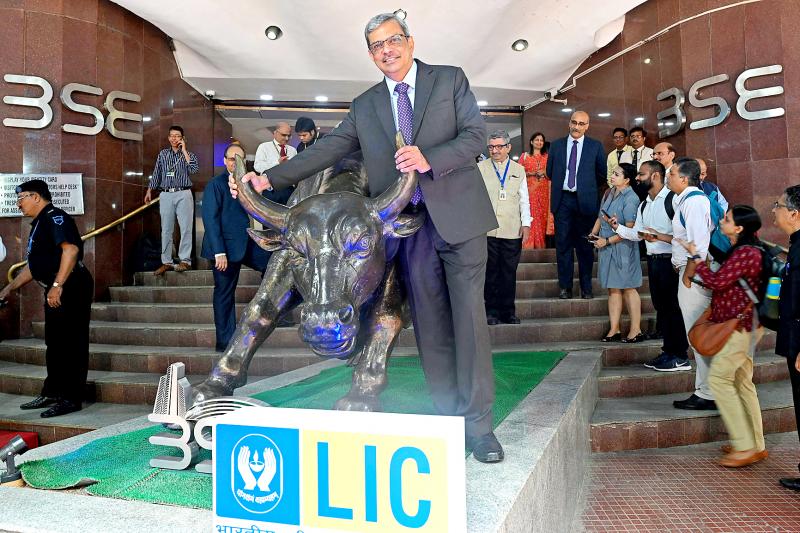State-owned Life Insurance Corp of India (LIC) slumped on its market debut yesterday following the country’s biggest-ever initial public offering (IPO), opening 7 percent below the offer price.
Indian Prime Minister Narendra Modi’s government raised US$2.7 billion by selling 3.5 percent of LIC as his administration seeks to privatize state assets to plug a gaping budget deficit.
However, it was forced to cut back the offer from a planned 5 percent after markets turned volatile following Russia’s invasion of Ukraine and China’s COVID-19 lockdowns.

Photo: AFP
The offer price of 949 rupees had valued LIC at US$77 billion, but it opened yesterday on Mumbai’s exchange trading 7 percent lower. The share price fall expanded to 9.4 percent before recovering slightly.
The muted debut could test the appetite of new shareholders for further flotations of nationalized companies as Modi seeks to sell off state assets to plug an estimated 16.6 trillion rupee (US$213.5 billion) fiscal deficit.
The IPO saw enthusiastic participation from small investors and was oversubscribed nearly three times during the six-day application period.
However, foreign investors have withdrawn a net 1.71 trillion rupees from Indian equities so far this year, stock exchange data showed, as the US monetary policy tightening further roiled sentiment.
Founded in 1956 by nationalizing and combining more than 240 firms, LIC was for decades synonymous with life insurance in post-independence India, until the entry of private companies in 2000.
It continues to lead the pack with a 61 percent share of the market in India, with its army of 1.3 million “LIC agents” giving it huge reach, particularly in remote rural areas.
However, LIC’s market share has slid steadily in the face of competition from net-savvy private insurers offering specialized products.
The firm said in its regulatory filing that “there can be no assurance that our corporation will not lose further market share” to private companies.
The IPO followed a years-long effort by bankers and bureaucrats to appraise the mammoth insurer and prepare it for listing.
LIC is also India’s largest asset manager, with 39.55 trillion rupees under management as of Sept. 30, including significant stakes in Indian blue chips such as Reliance and Infosys.
LIC’s real-estate assets include vast offices at prime urban sites, including a 15-story office in Chennai that was once the country’s tallest building.
The firm is also believed to own a large collection of rare and valuable artwork that includes paintings by MF Husain — known as the Pablo Picasso of India — although the value of these holdings has not been made public.

In Italy’s storied gold-making hubs, jewelers are reworking their designs to trim gold content as they race to blunt the effect of record prices and appeal to shoppers watching their budgets. Gold prices hit a record high on Thursday, surging near US$5,600 an ounce, more than double a year ago as geopolitical concerns and jitters over trade pushed investors toward the safe-haven asset. The rally is putting undue pressure on small artisans as they face mounting demands from customers, including international brands, to produce cheaper items, from signature pieces to wedding rings, according to interviews with four independent jewelers in Italy’s main

Japanese Prime Minister Sanae Takaichi has talked up the benefits of a weaker yen in a campaign speech, adopting a tone at odds with her finance ministry, which has refused to rule out any options to counter excessive foreign exchange volatility. Takaichi later softened her stance, saying she did not have a preference for the yen’s direction. “People say the weak yen is bad right now, but for export industries, it’s a major opportunity,” Takaichi said on Saturday at a rally for Liberal Democratic Party candidate Daishiro Yamagiwa in Kanagawa Prefecture ahead of a snap election on Sunday. “Whether it’s selling food or

CONCERNS: Tech companies investing in AI businesses that purchase their products have raised questions among investors that they are artificially propping up demand Nvidia Corp chief executive officer Jensen Huang (黃仁勳) on Saturday said that the company would be participating in OpenAI’s latest funding round, describing it as potentially “the largest investment we’ve ever made.” “We will invest a great deal of money,” Huang told reporters while visiting Taipei. “I believe in OpenAI. The work that they do is incredible. They’re one of the most consequential companies of our time.” Huang did not say exactly how much Nvidia might contribute, but described the investment as “huge.” “Let Sam announce how much he’s going to raise — it’s for him to decide,” Huang said, referring to OpenAI

The global server market is expected to grow 12.8 percent annually this year, with artificial intelligence (AI) servers projected to account for 16.5 percent, driven by continued investment in AI infrastructure by major cloud service providers (CSPs), market researcher TrendForce Corp (集邦科技) said yesterday. Global AI server shipments this year are expected to increase 28 percent year-on-year to more than 2.7 million units, driven by sustained demand from CSPs and government sovereign cloud projects, TrendForce analyst Frank Kung (龔明德) told the Taipei Times. Demand for GPU-based AI servers, including Nvidia Corp’s GB and Vera Rubin rack systems, is expected to remain high,